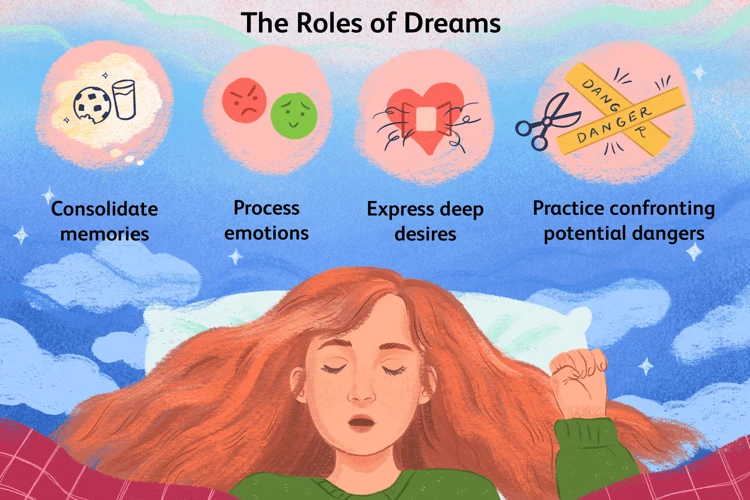Falling in dreams is a universally common experience that can leave us feeling perplexed and unsettled upon waking. These dreams often carry deep symbolism and can reflect our fears, insecurities, and the need for transformation. They can also have a significant impact on our mental well-being, causing anxiety and stress. In this article, we will delve into the hidden meanings behind falling dreams and explore the psychological implications they may have. Additionally, we will discuss practical strategies for dealing with these dreams and finding empowerment in the face of fear. So, let’s dive into the intriguing world of falling dreams and decode their symbolism step-by-step.
Understanding Falling Dreams

Falling dreams can be fascinating and enigmatic experiences that can leave us pondering their deeper meaning. Understanding the symbolism of falling dreams requires us to explore their nature and common elements. Falling dreams typically involve a sensation of descending rapidly, often accompanied by feelings of fear or insecurity. They can occur during different stages of sleep, such as during the rapid eye movement (REM) phase. Some dream theorists suggest that falling dreams may symbolize the fear of failure and insecurity in waking life. Others propose that they reflect a sense of lacking control and powerlessness. Additionally, falling dreams can signify transition and transformation, as the act of falling often represents a movement from one state to another. By unraveling the intricate symbolism of falling dreams, we can gain deeper insights into our subconscious thoughts and emotions. To further explore the symbolic world of dreams, you may also be interested in decoding the meaning of animal symbols in dreams, understanding the significance of clothing symbols in dreams, or exploring the hidden messages behind common dream symbols.
What are Falling Dreams?
Falling dreams are a type of dream where the dreamer experiences a sensation of falling. This sensation can vary in intensity and duration, but it often evokes strong emotions such as fear, panic, or unease. In these dreams, the dreamer may find themselves descending rapidly from a great height or falling into an endless abyss. The vividness of the experience can be so overwhelming that it may even jolt the dreamer awake. Falling dreams are quite common and can occur during different stages of sleep, particularly during the REM phase.
The symbolism behind falling dreams can be multi-faceted. On one hand, they may represent a fear of failure and insecurity in waking life. The act of falling can mirror the fear of losing control, making mistakes, or facing undesirable consequences. These dreams might reflect underlying anxieties about our abilities, self-worth, or the potential negative outcomes of our actions.
On the other hand, falling dreams can also signify a lack of control and powerlessness in certain aspects of life. They might manifest when we feel overwhelmed by circumstances or when we believe we have no influence over a particular situation. Falling can symbolize a relinquishment of control, a surrender to forces beyond our reach.
In some cases, falling dreams may carry a more positive connotation, signifying a transition or transformation. The act of falling can represent a journey from one state to another, a symbolic letting go of old patterns or beliefs in order to embrace new possibilities. These dreams may arise during times of significant change or personal growth, indicating a profound inner shift that is taking place.
Understanding the meaning of falling dreams requires careful introspection and consideration of one’s personal circumstances and emotions. By analyzing the various elements of these dreams – such as the context, emotions, and recurring patterns – individuals can gain valuable insights into their subconscious fears, desires, and aspirations.
Common Elements of Falling Dreams
Common elements found in falling dreams can provide further insights into their symbolism. While each dream is unique, there are recurring themes and scenarios that often accompany these dreams. One common element is the sensation of falling rapidly through the air, often accompanied by feelings of fear, panic, or anxiety. This sensation is typically vivid and realistic, making it even more unsettling upon waking. Another element is the lack of control or inability to stop the fall. In these dreams, individuals often feel helpless and powerless, unable to alter the course of their descent. The surroundings during the fall can also vary greatly, ranging from open spaces like cliffs or tall buildings to confined spaces like elevator shafts or staircases. The height from which one falls can differ as well, with some dreams featuring short falls while others involve long, seemingly endless descents. Interestingly, some falling dreams may incorporate other symbols, such as flying or being chased, adding layers of complexity to their interpretation. By recognizing and analyzing these common elements, we can gain a deeper understanding of the symbolism and messages hidden within our falling dreams.
Interpreting the Symbolism

When it comes to interpreting the symbolism behind falling dreams, it is essential to delve into the specific meanings they may hold. One possible interpretation is that these dreams reflect a deep-seated fear of failure and insecurity. The act of falling can symbolize a perceived loss of control or the fear of not living up to expectations. It can also represent the vulnerability and uncertainty that accompany stepping outside of our comfort zones. Another interpretation is that falling dreams signify a sense of powerlessness and a lack of control in waking life. These dreams may be a reflection of our struggles with making decisions or feeling overwhelmed by external circumstances. However, falling dreams can also carry a positive symbolism. They can indicate a desire for change and transformation, as the act of falling represents a transition from one state to another. By exploring the various interpretations of falling dreams, we can gain a deeper understanding of our subconscious thoughts and emotions.
Fear of Failure and Insecurity
is a key element often associated with falling dreams. When we experience a falling dream, it can symbolize our deep-rooted anxieties about failure and a sense of insecurity in our waking lives. The act of falling itself represents a loss of control and a fear of the unknown. It can be a metaphorical expression of our worries and doubts about not being able to meet expectations or the fear of making mistakes. Falling dreams might be triggered by specific situations or events in our lives that have heightened our insecurities. For instance, it could be related to challenges at work, academic stress, or personal relationships. These dreams serve as reminders for us to address and confront these fears head-on. It is crucial to acknowledge that falling dreams do not indicate impending failure or the inevitability of negative outcomes but rather highlight our concerns and call for self-reflection and growth. By examining the underlying causes of our fears, we can work towards building resilience and finding reassurance within ourselves.
Lack of Control and Powerlessness
One of the key interpretations of falling dreams is the symbolism of a lack of control and powerlessness. When we experience these dreams, we often feel a sense of helplessness as we descend uncontrollably. This can mirror similar feelings we experience in waking life when we encounter situations where we have little control over the outcome. The dream may be reflecting our subconscious anxieties about not being able to steer our lives in the direction we desire.
Falling dreams can highlight areas in our waking life where we feel powerless or overwhelmed. It can represent struggles within relationships, work environments, or personal aspirations. This dream motif can serve as a reminder for us to examine the areas where we may need to regain control or seek support. It pushes us to confront the underlying issues that contribute to feelings of powerlessness and take steps towards reclaiming our agency.
Falling dreams can be a reflection of our fear of losing control or being overwhelmed by circumstances. It is common to experience such dreams during times of great stress or when facing major life changes. The dream acts as a manifestation of the anxiety we feel about the unknown and our uncertain future. By recognizing and addressing these fears, we can work towards establishing a sense of control and finding ways to cope with the challenges that life presents.
Falling dreams can also serve as a reminder that it is okay to relinquish control and trust the process of life. Sometimes, we hold onto control tightly, fearing any deviation from our plans. However, these dreams can be an invitation to let go and allow things to unfold naturally. It is an opportunity to develop resilience, adaptability, and acceptance of life’s uncertainties.
Understanding the symbolism of a lack of control and powerlessness in falling dreams helps us gain insights into our own fears and challenges. By acknowledging these emotions, we can take steps to regain control over our lives, seek support when needed, and develop a sense of empowerment in the face of adversity.
Transition and Transformation
Falling dreams often carry a profound message of transition and transformation. When we experience the sensation of falling in our dreams, it can symbolize a significant change or shift happening in our lives or within ourselves. This symbolic freefall represents the process of letting go of old patterns, beliefs, or aspects of our identity that no longer serve us. Just as gravity pulls us downwards in the dream, the act of falling reflects the release of old attachments, enabling us to move forward and embrace new beginnings. It signifies a necessary process of growth and evolution.
During times of transition and transformation, falling dreams may become more frequent as our subconscious mind grapples with the changes and uncertainties we are facing. These dreams can be seen as invitations to explore the unknown and surrender to the natural flow of life. They encourage us to let go of our resistance and trust in the transformative journey we are undertaking.
In the context of transition and transformation, falling dreams can also represent the fears and anxieties that arise when stepping out of our comfort zone. As we venture into new territories and unfamiliar experiences, a sense of vulnerability and insecurity is not uncommon. However, it is essential to remember that these dreams are not meant to instill fear but to provide an opportunity for growth and self-discovery.
To fully embrace the symbolism of transition and transformation in falling dreams, one can explore different strategies such as journaling, meditation, or seeking support from a therapist or mentor. These practices can help us gain deeper insights into the changes we are undergoing and provide guidance on how to navigate this transformative journey. By embracing the message of falling dreams within the context of transition and transformation, we can emerge stronger, wiser, and more aligned with our authentic selves.
Psychological Implications

Psychological implications of falling dreams delve into the impact they can have on our mental well-being and strategies for dealing with the anxiety and stress they may cause. Falling dreams can be unsettling and may leave us feeling vulnerable or even traumatized upon waking. They can trigger feelings of anxiety, fear, and helplessness, and may even contribute to sleep disturbances and overall psychological distress. Recognizing and addressing the emotional impact of falling dreams is crucial for maintaining mental well-being. Coping strategies such as stress management techniques, mindfulness practices, and therapy can help individuals navigate the psychological implications of falling dreams. By addressing the underlying anxieties and fears, individuals can begin to find relief and regain a sense of control over their mental and emotional state. It is crucial to prioritize self-care and seek professional support if needed to mitigate the adverse effects of falling dreams on psychological well-being.
Impact on Mental Well-being
The impact of falling dreams on mental well-being can be significant and varied. Here are some key points to consider:
| Emotional Distress: | Falling dreams can cause emotional distress, leading to feelings of fear, anxiety, and unease upon waking. The vivid nature of these dreams often leaves a lasting impression, affecting our mood and overall mental well-being. |
| Heightened Anxiety: | Repeatedly experiencing falling dreams can contribute to heightened levels of anxiety and stress. The fear of falling, even in a dream state, can unconsciously carry over into daily life, increasing feelings of unease and apprehension. |
| Disrupted Sleep: | Frequent falling dreams can disrupt the quality of sleep, leading to sleep disturbances and fatigue. When our sleep is continually interrupted by unsettling dreams, it can have a negative impact on our mental and physical well-being. |
| Symbolic Reflection: | Falling dreams often symbolize deeper emotional and psychological issues within ourselves. By examining and interpreting the symbolism of these dreams, we can gain insight into our subconscious thoughts, fears, and insecurities, leading to a greater understanding of our mental well-being. |
| Opportunity for Reflection: | Falling dreams provide an opportunity for introspection and self-reflection. They can serve as a catalyst for addressing underlying issues, such as fear of failure, lack of control, or the need for transformation. By exploring these themes, we can work towards improving our mental well-being. |
Understanding the impact of falling dreams on mental well-being is essential for addressing any negative effects they may have. It is crucial to develop coping strategies and seek support, whether through therapy, self-help techniques, or discussing these dreams with trusted individuals. By addressing and understanding the psychological implications of falling dreams, we can take steps towards improving our overall mental well-being and finding greater peace of mind.
Dealing with Anxiety and Stress
Dealing with anxiety and stress is crucial when it comes to alleviating the impact of falling dreams on our mental well-being. Anxiety and stress can be significant factors that contribute to the occurrence and intensity of falling dreams. It is essential to acknowledge and address these emotions to promote better sleep and overall psychological health. One effective strategy is to practice stress management techniques, such as deep breathing exercises, meditation, or engaging in calming activities like yoga or journaling. Creating a consistent bedtime routine can also help reduce stress and promote relaxation before sleep. Additionally, seeking support from a therapist or counselor can be beneficial in managing anxiety and stress related to falling dreams. They can provide guidance and tools for coping with these emotions and addressing underlying issues. It is important to remember that self-care plays a vital role in managing anxiety and stress. Taking care of your physical health, practicing self-compassion, setting boundaries, and engaging in activities that bring joy and relaxation can all contribute to reducing anxiety and stress levels. By implementing these strategies, individuals can work towards minimizing the psychological impact of falling dreams and promoting overall well-being.
Practical Strategies
When faced with recurring falling dreams or the anxieties they may evoke, it is essential to have practical strategies in place to address and overcome these challenges. Implementing practical strategies can help confront fears and insecurities associated with falling dreams, leading to empowerment and a sense of resilience. One effective approach is to confront the underlying fears head-on. This can involve journaling about the dream, discussing it with a trusted friend or therapist, or engaging in mindfulness techniques to gain a deeper understanding of the emotions involved. Building resilience and empowerment is another crucial aspect of dealing with falling dreams. In this regard, practices such as self-care, positive affirmations, and visualization exercises can help regain a sense of control and inner strength. By actively incorporating these practical strategies into our lives, we can navigate the symbolism of falling dreams and develop valuable tools for personal growth and well-being.
Confronting Fears and Insecurities
One important aspect of navigating falling dreams is to confront our fears and insecurities head-on. These dreams often stem from deep-rooted anxieties that we may have been avoiding or suppressing in our waking lives. By acknowledging and addressing these fears, we can begin to understand their origins and gain a sense of empowerment. Here are some strategies for confronting fears and insecurities:
- Self-reflection: Take the time to reflect on your fears and insecurities. What specific situations or aspects of your life do they relate to? Are there any patterns or recurring themes? Self-reflection can help bring hidden fears to the surface and provide a starting point for addressing them.
- Therapy or counseling: Seeking professional support from a therapist or counselor can be immensely valuable in confronting and overcoming deep-seated fears and insecurities. They can provide guidance, offer coping strategies, and help you navigate the underlying issues that contribute to these feelings.
- Gradual exposure: Gradually exposing yourself to situations that trigger your fears can help desensitize you and build resilience. Start with small steps and gradually increase your exposure, allowing yourself to confront and overcome your insecurities at a manageable pace.
- Challenge negative thoughts: Often, our fears and insecurities stem from negative thoughts and beliefs we hold about ourselves. Challenge these thoughts by questioning their validity and replacing them with positive and affirming ones.
- Practice self-care: Taking care of your overall well-being is crucial when confronting fears and insecurities. Engage in activities that bring you joy and cultivate self-confidence. This can include exercise, hobbies, spending time with loved ones, or practicing mindfulness and relaxation techniques.
Remember, confronting fears and insecurities is a brave and transformative journey. It may take time and effort, but by embracing this process, you can reclaim your power and overcome the limitations that falling dreams may symbolize.
Building Resilience and Empowerment
Building resilience and empowerment is crucial when it comes to dealing with the unsettling emotions and fears associated with falling dreams. Here are some practical strategies to help you navigate through these dreams and find strength within yourself:
- Self-reflection and self-awareness: Take the time to reflect on your feelings and thoughts surrounding the falling dreams. Explore any patterns or recurring themes that may be present. This self-awareness can provide valuable insights into the underlying fears or insecurities that these dreams represent.
- Challenge negative beliefs: Identify any negative beliefs or self-doubt that may be contributing to your feelings of powerlessness. Replace these negative thoughts with positive affirmations and empowering statements. Practice self-compassion and remind yourself of your strengths and capabilities.
- Seek support: Reach out to trusted friends, family members, or professionals who can provide a supportive and non-judgmental space for you to express your emotions. Talking about your dreams and the emotions they stir up can help you gain different perspectives and receive guidance in building resilience.
- Develop coping strategies: Explore healthy coping mechanisms that can help manage anxiety and stress related to falling dreams. This may include regular exercise, relaxation techniques such as deep breathing or meditation, engaging in creative outlets, or journaling to process your emotions.
- Set goals and take action: Identify areas of your life where you may be feeling a lack of control or powerlessness. Start setting small, achievable goals in these areas and take action steps to regain a sense of empowerment. Each small step forward can contribute to building resilience over time.
- Practice self-care: Prioritize self-care activities that nurture your mental, emotional, and physical well-being. Establish a consistent sleep routine, maintain a balanced diet, engage in activities that bring you joy, and practice mindfulness to stay present and centered.
By implementing these strategies, you can gradually build resilience and empower yourself to confront your fears, overcome insecurities, and transform the negative symbolism of falling dreams into opportunities for growth and personal development. Remember, you have the ability to shape your own narrative and find strength within yourself.
Conclusion
In conclusion, falling dreams hold a rich tapestry of symbolism that can provide invaluable insights into our subconscious thoughts and emotions. These dreams often represent our fears, insecurities, and the need for transformation. By understanding the hidden meanings behind falling dreams, we can gain a deeper understanding of ourselves and our psychological well-being. It is important to recognize the impact that these dreams can have on our mental well-being, as they can evoke feelings of anxiety and stress. However, by confronting our fears and insecurities, we can begin to build resilience and empower ourselves to face the challenges of life. Strategies such as cognitive behavioral therapy, dream journaling, and practicing mindfulness can help us navigate the complex realm of falling dreams and find inner peace. Remember, falling dreams are not to be feared, but rather embraced as opportunities for growth and self-discovery. So, the next time you find yourself plummeting through the depths of your dreams, take a moment to decipher the underlying symbolism and use it as a stepping stone towards personal transformation and empowerment.
Frequently Asked Questions
FAQs About Falling Dreams
1. Why do we have falling dreams?
Falling dreams can occur due to various reasons, such as feelings of insecurity, fear of failure, or a sense of powerlessness in waking life. They may also symbolize a need for transition and transformation.
2. Are falling dreams a sign of something negative?
Not necessarily. While falling dreams can be unsettling, they often reflect our subconscious thoughts and emotions rather than predicting negative events. They can provide an opportunity for self-reflection and personal growth.
3. Can falling dreams be associated with anxiety disorders?
Yes, falling dreams can be linked to anxiety disorders. They can surface as a result of high-stress levels or underlying anxiety. Consulting a mental health professional can help identify and manage any underlying anxiety issues.
4. Do falling dreams always have the same meaning for everyone?
No, the meaning of falling dreams can vary from person to person. It is crucial to consider individual experiences, emotions, and life circumstances when interpreting the symbolism of these dreams.
5. Are falling dreams more common in certain age groups?
Falling dreams can occur at any age, but they may be more common during early adulthood when individuals often experience significant life changes and uncertainties.
6. Can recurring falling dreams have a specific significance?
Recurring falling dreams may indicate unresolved issues or persistent fears that need attention. They can serve as reminders to address these concerns and work towards finding inner peace.
7. Can falling dreams be controlled or influenced?
While you cannot directly control your dreams, keeping a dream journal, practicing relaxation techniques before sleep, and maintaining a healthy lifestyle can contribute to better dream recall and potentially influence the content of dreams.
8. How can falling dreams affect our waking life?
Falling dreams can impact our mental well-being, inducing feelings of anxiety and stress that can carry over into our daily lives. Understanding and interpreting these dreams can help alleviate their influence on our waking state.
9. Are there any positive interpretations of falling dreams?
Yes, falling dreams can also have positive interpretations. They can signify the courage to confront fears, adaptability to change, or a desire for personal growth and transformation.
10. Is it possible to stop having falling dreams?
While it is not guaranteed to completely stop having falling dreams, addressing underlying fears and anxieties, practicing stress management techniques, and cultivating a positive mindset can potentially reduce the frequency and intensity of these dreams.








